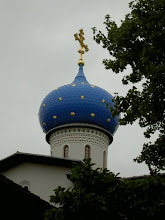24/02/2010
The time of year is again approaching when Orthodox Christians come together during the season of Great Lent to participate in the Mystery of Holy Unction. It will be celebrated in our diocese on Saturday, the 20th of March, being the 7th of March in the Church calendar and the Saturday of the Akathist Hymn to the Mother of God. This will take place at 3 o' clock in the afternoon at the Cathedral of the Dormition of the Mother of God and the Holy Royal Martyrs, in Chiswick, West London.
The time of year is again approaching when Orthodox Christians come together during the season of Great Lent to participate in the Mystery of Holy Unction. It will be celebrated in our diocese on Saturday, the 20th of March, being the 7th of March in the Church calendar and the Saturday of the Akathist Hymn to the Mother of God. This will take place at 3 o' clock in the afternoon at the Cathedral of the Dormition of the Mother of God and the Holy Royal Martyrs, in Chiswick, West London.
The service consists of seven epistles and seven Gospels, each reminding us of the healing brought to us by Christ. In his general Epistle, St James, the Brother of the Lord, exhorts the local churches, saying 'Is any man sick among you? Let him bring in the priests of the church, and let them pray over him, anointing him with oil in the name of the Lord' (James 5:14). Acknowledging our physical and spiritual sickness, we come to God in prayer, asking for healing of our souls and bodies, for the sake of our salvation.
In a time when the world presents us with all manner of alternative therapies, self-help books, and new age healing techniqies, relying on man's own power to heal himself, it is important for us Christians to remind ourselves that it is Christ Who heals us; it is Christ Who redeems fallen creation, with its suffering and pain; it is Christ alone Who has conquered the power of sin and death by his glorious Resurrection. Therefore, it is to Christ that we must turn for healing of our souls and bodies; it is in the incarnate Christ that we must trust to raise us beyond the mire of fallenness through his Resurrection and Ascension, and it is to Christ that we must pray with compunction and humility.
Because Holy Unction is intrinsically bound to the physical and spiritual healing that we receive in the life of the Church, we must approach this Mystery as we would Holy Communion, and seek to free ourselves of the sins that separate us from the fullness of life in Christ. Therefore, it is proper that we should confess our sins and be absolved before we are anointed.
May this anointing strengthen us in our pilgrim journey into the fullness of life in Christ, at the will of the Father, and through the power of the Holy and life-creating Spirit.


